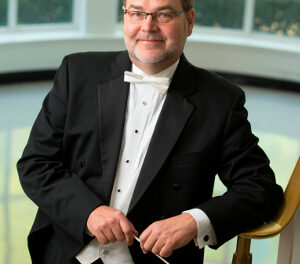What a pleasant experience, in the midst of a season laden with kitsch and commercialism, to find a concert that presents a lovely Mozart favorite, a delightful holiday gem by Berlioz and a little fun just for kicks.
The Hillyer Community Chorus, under the direction of Bill Rashleigh began their concert with the gentle lullaby known as “The Shepherd’s Farewell” from Hector Berlioz’s L’Enfance du Christ. Having begun its existence as a casual tune dashed off on a scrap piece of paper, this melody became the seed for the eventual oratorio and one of Berlioz’s most well-known choral creations.
The oboes playing the introduction and interludes, struggled a little, and the choir did not find the right dynamic phrasing until near the end. Still, it was a pleasant bridge from the hustle and bustle outside to the very different experience in the inviting sanctuary of Hillyer Memorial Christian Church which has sponsored this choral group for over forty years.
The featured work on the program was Mozart’s Vesperae solennes de Confessore, K. 339. Composed in 1780, and one of the last service settings created for the Salzburg Cathedral, it is scored for four soloists, choir and orchestra including bassoon, two trumpets, three trombones, strings and organ. It contains some of Mozart’s boldest Salzburg church music especially in the first three Psalms (109-111): “Dixet,” “Confitebor” and “Beatus Vir.” “Laudate Pueri Dominum” (Ps. 112) is an exercise in strict, old-fashioned counterpoint, and presents a powerful statement, with trombone underpinning. Then, in striking contrast, comes the ethereal beauty of “Laudate Dominum” (Ps. 116). The Vespers closes with “Magnificat.”
The chorus and orchestra had some shaky moments with ensemble and intonation, yet the charm, power and beauty of Mozart’s treasure shined through. The soloists: Meg Risinger, Marti Boger, George Deaton and William Adams, provided nice contrasts with the texture of the full chorus. Risinger sang a warm and lovely performance of the exquisite “Laudate Dominum.”
The concert concluded with Rashleigh’s composition Koncert Stuck, Op. 16. It consisted of an unaccompanied choral setting of musical terms from “Forte” to “Fine.” The chorus got into it enthusiastically and had fun with it; as did the audience.
It was a pleasant evening topped off with a very nice reception in the church fellowship hall providing an opportunity to meet the performing artists. Perhaps it was also an occasion to acknowledge the end of an era. Paul Conway left a remarkable heritage. A new era is now under way.











